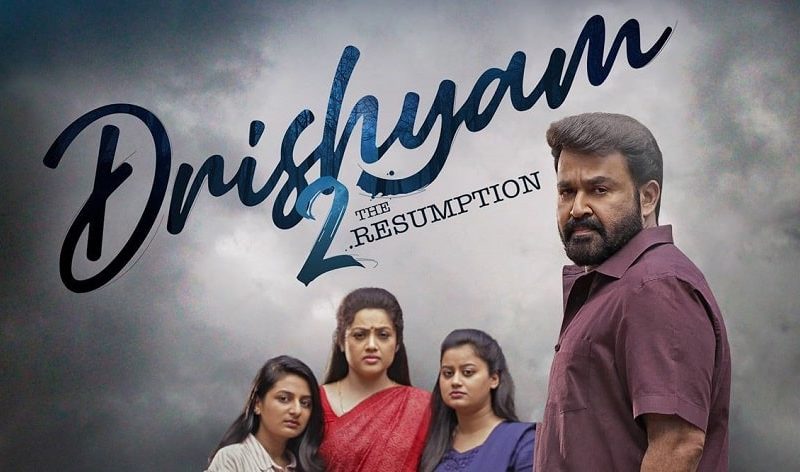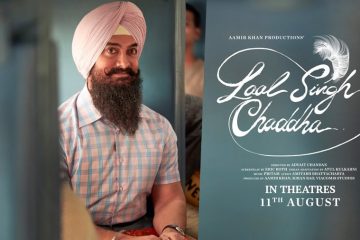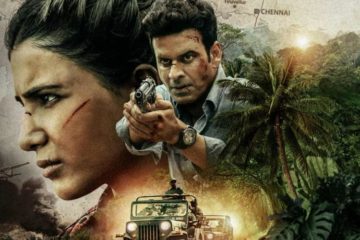Written by : Shreya Seth
What happens when the life of an ordinary person living a normal life with his family, tucked in a remote corner of someplace, is suddenly disrupted one day? To what extent can he go to protect his family, especially when they are being interrogated by the mighty and powerful administration and police who pledge to not give up until they prove them guilty?
Writer- Director, Jeethu Joseph, is a master storyteller for a reason, and his films ‘Drishyam’ (2013) and its sequel ‘Drishyam 2: The Resumption’ (2021) bear testimony to that. When Drishyam (meaning to see), was dropped in 2013, it took the theatres by the storm, because it was a breakthrough in Malayalam cinema and storytelling- the strong plot, detailed writing, effective character arcs, and slow yet impactful unfolding of the sequences to narrate the story of a common man, George Kutty ( played by the iconic Mohanlal) and his family, pitted against another family and the gate-keepers of the criminal justice system, the police. The film shattered the box office numbers, making it one of the highest grossing Malayalam films of all time, and was remade in several languages including Tamil, Telugu, Hindi, Kannada, helmed by some of the most well known actors in the country.The film’s popularity was not just limited to India, filmmakers from other countries also started acquiring the rights to remake the film in their languages and it was soon remade in Sinhalese (Dharmayuddhaya; 2017) and Mandarin (Sheep without a Shepherd; 2019) , while an Indonesian remake is also in the pipeline.
Jeethu Joseph’s film ‘Drishyam’ (2013), is no ordinary cat-and-mouse game. There are no flying cars or mind boggling action sequences, so we can be grateful that it isn’t the usual banal content that is served to us in abundance. Instead, the premise revolves around ordinary people, their children, and the underlying emotions- of fear, guilt, anger, and pain that steer most of their actions. The protagonist, George Kutty, a simple middle-class man and a cable tv operator dreams of owning a movie theatre someday. His wife Rani (Meena) and daughters, Anju (Ansiba) and Anu (Esther Anil), desire a better lifestyle, but to their disappointment, their father is a penny pincher. The film may seem like a bit of a slog in the beginning, and almost one hour of the long 2hr 40 min film spent in establishing the characters- George Kutty and his family, the people in his neighbourhood and his cordial ties with them, his obsession with cinema and how it is the only source of knowledge and inspiration for a man who is a school dropout, while the director also ensures to seed in his tiff with a local cop which is crucial to tying the loose ends later.
It is not until the second half sets in that the twists and turns catch us completely off guard. George Kutty’s daughter, Anju, attends a nature camp, where a notorious boy, Varun Prabhakar, (son of IG Geeta Prabhakar) behaves inappropriately and clicks their pictures without consent. Things get murky later, when he ends up stalking Anju and attempts to sexually assault her and threatens to leak her videos. In this carefully crafted scene, we realize that we’ve reached the tipping point of the story- the next step will change something forever, and their lives won’t be the same anymore. Anju and her mother wail and beg, but only in vain and the viewer is prompted to feel their restlessness and anxiety as the perpetrator advances towards them. Before we know it, Anju has blood on her hands.
What ensues thereafter is sheer genius delivered by writer-director Jeethu Joseph and presents an integral question before us- Wouldn’t anyone in a similar situation do what George Kutty’s family did to protect themselves? As we struggle to find answers to these questions, the righteous George Kutty (Mohanlal) answers them for us by assuring his wife that what they did was right. The director weaves George Kutty’s earthy character with precision, everything that we learn about him as a person has been conveyed to us for a reason, and Mohanlal effortlessly fits into the shoes of Kutty- a respectable, patriarchal man who goes to work every day and stands up to injustices, he spends nights at his office watching films, but also makes it a point to remind his wife that a dutiful woman is confined to the kitchen upon marriage. When an extraordinary situation looms over their heads, he is unflinching and ready to move mountains to shield his family.
Drishyam isn’t just a story of self-defense that resulted in an accidental crime, the stakes are high because Varun is the son of IG Geeta Prabhakar, and with the entire machinery tracing down her missing son, there are little or no chances for George Kutty’s family to escape the ruthless system. What does George Kutty have to his advantage if not for his integrity and street smartness that can sail them through this adversity? While he does outwit the police by creating an alibi and planning two steps ahead of them, he is often consumed by his own vulnerability and guilt which leaves an impact on us, especially in scenes where he confronts IG Geeta Prabhakar (essayed by Asha Sarath), whose piercing gaze is enough to convey her anguish.
What makes the film so path-breaking is that it centers itself around the life of ordinary people, but adds the much needed ingenuity to mundane storytelling that is seldom explored in mainstream Indian cinema which often falls prey to gimmicks. While other actors do justice to their parts, fuelling the fire that is needed to strengthen the plot and reiterate the message loud and clear- forced confessions, violence- mental or physical, no matter what they are meted out with, they will not budge. But there is only so much they can do in a film that mostly relies on the lead actor, the legendary Mohanlal as the father who knows it all and can do it all by himself, secretly calculating and implementing his moves in the dead of the night.
Drishyam is a clever film with a minimalist set up, devoid of the usual trappings of popular cinema, there are no forced song and dance sequences, no flexing of muscles, melodramatic dialogues, or elaborate sets. The world that Joseph’s characters inhabit are as real as it could get, the characters are flawed, thus relatable. It is only the cerebral power of the protagonist, a regular man, consumed by his love for cinema and his resolve to stand up for his family that helps connect the dots to transform a simple plot into a gut wrenching family drama cum thriller. The screenplay however, at times, tends to get a little expository with writer-director, Jeethu Joseph, feeding almost every little detail to the viewers. By the time we reach the climax, we already know that George Kutty would have anticipated what was coming his way- the police would torture his younger daughter into confessing to the crime and attempt to unearth Varun’s body, so he was cautious to plan in advance and replace it with the corpse of a cow.
Drishyam is as complete as a film could be, the director perhaps thought it necessary to ensure that there is a closure of sorts, not just for the audiences, but also for the characters of his story. The police are unable to locate Varun’s body, and a guilt ridden yet helpless George Kutty vaguely confesses to Geeta Prabhakar and her family that an uninvited guest had encroached upon their space and turned a deaf ear to their pleas, which resulted in a mishap. The film comes to a close, almost with a sharp and clear thud, as both the families decide to walk the path that now lies ahead of them.
Little did we know that almost 6 years down the line, writer-director Jeethu Joseph would be back with a sequel to the first part. As is the norm, films that outperform all expectations are best left at that. Sequels could be risky and bring down the merit of a phenomenal film like Drishyam, but Jeethu Joseph decided to take the plunge and take the story forward. The sequel, Drishyam 2: The Resumption, was released on Amazon Prime Video in February 2021, and the story takes off six years later with George Kutty and his family still living under the shadow of past events. George Kutty now runs his own theatre and produces films, Anju has various mental health issues, experiences frequent nervous breakdowns, and is prone to seizures; the family has lost the trust and sympathy of most people who had previously extended their support and are now suspicious of George Kutty’s family and envy his success, except for a kind neighbour who understands the family and develops a special bond with Reena. Once again, like the first part, Jeethu Joseph decides to take his time to develop the story, bit by bit, in his characteristic style, which is a bit tedious to endure.
Drishyam 2: The Resumption, is not a stand alone film, unlike many sequels which can be watched irrespective of their previous parts. It is sincere in its approach and the director tries to put all the pieces together by mapping a natural progression of the story and the characters six years down the line while emphasizing on the incident that has left them scarred for life. The police are keen on pursuing the case, and Kutty’s family is bearing the brunt of their actions, so much so that a shiver runs down their spine every time they see the cops. Newer elements have been introduced in a subtle way to blend with the story, and Murali Gopi shines in his performance as the shrewd IPS Thomas Bastin who carefully designs a trap for George Kutty, only to realize that it is impossible to win this war against him. However unlike Drishyam, Drishyam 2 seems to have lost the rawness that the story brought with it, the confrontations with the police are a little less exciting and George Kutty’s clever stratagems are too arduous, complicated, and vague until we reach the climax. It makes one wonder, how conniving could an ordinary man like George Kutty be to nurture friendships with the most unusual of people over a period of time, only to use them for his master plan?
What made Drishyam so unique was Jeethu Joseph’s vision, to blend the ordinary with the extraordinary. It’s not like we weren’t in awe of George Kutty and found all his tactics plausible, but we still chose to root for him, because we could relate, because we didn’t want to see their family falling apart and could gauge that it was their helplessness, their sheer desperation, that forced them down a route they didn’t want for themselves. While the same can’t really be said for its sequel, which seems to grow a little distant from its audiences, it still remains a sincere and praiseworthy effort by writer-director Jeethu Joseph to bring to us a story that will remain with us for a long, long time. And for those of us who might think this is the end, the climax of Drishyam 2: The Resumption, may have left us wondering that a third and final part to the story might just take us by surprise, yet again!
About the author :
Shreya Seth lives and works in Kolkata, India.
Read More :
Family Man – Season 2 : A distorted notion of History for Generation Z




